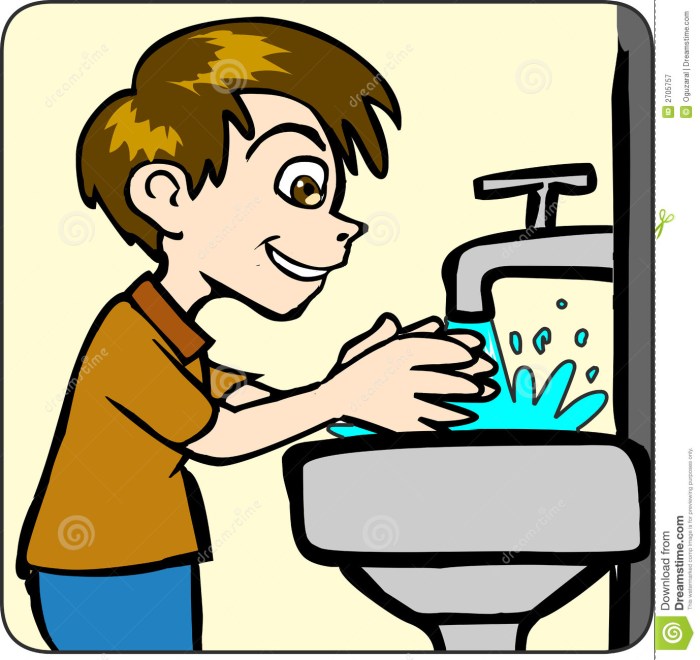Pedro Washes His Hands Before Eating sets the stage for this enthralling narrative, offering readers a glimpse into a story that is rich in detail and brimming with originality from the outset. This comprehensive guide delves into the fascinating world of hand hygiene and food safety, exploring the importance of handwashing, its health benefits, and effective techniques for ensuring thorough handwashing in various settings.
As we delve deeper into the topic, we will uncover the role of hands in transmitting bacteria and viruses, examining common pathogens that can spread through contaminated hands and the impact of handwashing on overall health and well-being. By understanding the science behind hand hygiene, we can empower ourselves to make informed decisions that safeguard our health and the well-being of those around us.
Hand Hygiene and Food Safety

Maintaining proper hand hygiene is crucial for food safety, as hands serve as potential vectors for transmitting bacteria and viruses that can contaminate food and cause illnesses. Thorough handwashing before eating helps prevent the spread of these harmful microorganisms.
Role of Hands in Transmitting Bacteria and Viruses
Hands frequently come into contact with various surfaces and objects, including door handles, keyboards, phones, and shared spaces. These surfaces can harbor a wide range of bacteria and viruses, which can be transferred to hands upon contact.
- Bacteria: Staphylococcus aureus(staph), Escherichia coli(E. coli), Salmonella, and Listeria monocytogenesare common bacteria that can cause foodborne illnesses if ingested.
- Viruses: Norovirus, rotavirus, and hepatitis A virus can be spread through contaminated hands and cause symptoms such as vomiting, diarrhea, and abdominal pain.
Health Benefits of Handwashing

Washing hands before eating is a simple yet effective way to protect one’s health. It can help reduce the risk of gastrointestinal illnesses, such as food poisoning and diarrhea, which can cause symptoms like nausea, vomiting, and abdominal pain.
Impact on Gastrointestinal Health
When hands are not washed properly, they can carry bacteria, viruses, and other microorganisms that can contaminate food. These microorganisms can cause gastrointestinal illnesses when ingested. Handwashing before eating helps remove these microorganisms, reducing the risk of contamination and subsequent illness.
Effective Handwashing Techniques

Maintaining proper hand hygiene is crucial for preventing the spread of harmful microorganisms and ensuring overall health and well-being. Effective handwashing techniques involve a series of specific steps that, when followed correctly, can significantly reduce the presence of bacteria, viruses, and other contaminants on the hands.
Proper Handwashing Steps
- Wet hands with clean, running water (warm or cold):Ensure hands are thoroughly wet before applying soap.
- Apply soap:Use a sufficient amount of soap to create a lather.
- Lather and scrub:Rub hands together vigorously for at least 20 seconds. Ensure all surfaces of the hands are covered, including palms, backs of hands, between fingers, and under nails.
- Rinse thoroughly:Rinse hands thoroughly with clean, running water to remove soap residue.
- Dry hands:Dry hands completely with a clean towel or air dry.
Tips for Thorough Handwashing
- Use warm or cold water, as hot water can damage the skin and make it more susceptible to infection.
- Apply enough soap to create a lather, as it helps break down dirt and microorganisms.
- Scrub hands for at least 20 seconds, as this duration is necessary to effectively remove contaminants.
- Pay attention to areas that are often missed, such as between fingers and under nails.
- Dry hands completely after washing to prevent the growth of bacteria.
Handwashing in Different Settings

Handwashing is an essential practice in maintaining good hygiene and preventing the spread of diseases. Its importance extends beyond personal hygiene, as it also plays a crucial role in public health and safety. In various settings, such as homes, schools, restaurants, and healthcare facilities, handwashing is of utmost importance for maintaining a clean and healthy environment.
Homes
In the home environment, handwashing is crucial for preventing the spread of germs and bacteria within the household. It is especially important after using the toilet, changing diapers, handling raw meat or poultry, and before eating or preparing food. Regular handwashing helps protect family members from illnesses such as colds, flu, and stomach bugs.
Schools
Schools are breeding grounds for germs, with children frequently interacting with each other and sharing common spaces. Handwashing is essential in schools to prevent the spread of infections among students and staff. It should be encouraged before and after using the bathroom, before eating, and after coming into contact with bodily fluids.
Restaurants
In the food service industry, handwashing is paramount for ensuring food safety and preventing foodborne illnesses. Restaurant staff must wash their hands thoroughly before handling food, after using the bathroom, and after touching potentially contaminated surfaces. Proper handwashing practices are crucial for maintaining a clean and hygienic food preparation environment.
Healthcare Facilities
Healthcare facilities are high-risk environments where handwashing is critical for preventing the transmission of infections among patients, visitors, and healthcare workers. Healthcare professionals must adhere to strict handwashing protocols before and after patient contact, after handling bodily fluids, and after touching contaminated surfaces.
Proper handwashing techniques are essential for maintaining a safe and infection-free environment in healthcare settings.
Behavioral Change and Handwashing

Promoting handwashing behavior faces challenges due to various factors, including cultural norms, personal habits, and lack of awareness about the importance of hand hygiene. Strategies for encouraging handwashing in different populations require tailored approaches, considering age, education level, and socioeconomic status.
Challenges of Promoting Handwashing Behavior
- Cultural norms and beliefs can influence handwashing practices, with some cultures having different perceptions of cleanliness and hygiene.
- Personal habits and routines can make it difficult to change ingrained behaviors, such as forgetting to wash hands before eating or after using the toilet.
- Lack of awareness about the importance of hand hygiene, especially in preventing the spread of infectious diseases, can lead to complacency and neglect of handwashing.
Strategies for Encouraging Handwashing in Different Populations
Tailoring handwashing promotion strategies to specific populations is essential for effectiveness. For children, educational programs using games, songs, and interactive activities can be engaging and memorable.
In schools and workplaces, providing accessible handwashing facilities, reminders, and regular hand hygiene training can create a supportive environment for good handwashing practices.
For healthcare settings, strict hand hygiene protocols, ongoing monitoring, and feedback mechanisms are crucial for preventing healthcare-associated infections.
Incentives or Rewards for Promoting Handwashing
- Positive reinforcement, such as praise, rewards, or recognition, can motivate individuals to adopt and maintain handwashing behavior.
- Gamification, using elements of game design like points, badges, and leaderboards, can make handwashing more engaging and fun.
- Social media campaigns and competitions can raise awareness, encourage participation, and foster a sense of community around hand hygiene.
Innovations in Handwashing: Pedro Washes His Hands Before Eating
In recent years, there have been several innovative technologies and products developed to promote handwashing and improve hand hygiene compliance. These innovations range from simple, low-cost solutions to more sophisticated and expensive technologies.
One of the most basic but effective innovations is the use of handwashing stations. These stations are typically placed in high-traffic areas, such as entrances to buildings, restrooms, and food preparation areas. They provide easy access to soap, water, and paper towels, making it convenient for people to wash their hands.
Another innovation is the use of automatic hand sanitizers. These devices dispense a measured amount of hand sanitizer onto the user’s hands, eliminating the need for soap and water. Automatic hand sanitizers are often placed in areas where it is not practical to install a handwashing station, such as on public transportation or in waiting rooms.
More sophisticated innovations include the use of sensors and cameras to monitor handwashing compliance. These systems can track how often people wash their hands and how long they wash them for. This information can be used to identify areas where handwashing compliance is low and to develop targeted interventions to improve compliance.
Successful Handwashing Campaigns, Pedro washes his hands before eating
Several successful handwashing campaigns have utilized innovative technologies to improve hand hygiene compliance. For example, the “Clean Hands Save Lives” campaign in the United Kingdom used handwashing stations and automatic hand sanitizers to promote handwashing in healthcare settings. The campaign resulted in a significant increase in handwashing compliance and a decrease in healthcare-associated infections.
Another successful campaign was the “Wash Your Hands” campaign in the United States. This campaign used a variety of innovative technologies, including handwashing stations, automatic hand sanitizers, and sensors to monitor handwashing compliance. The campaign resulted in a significant increase in handwashing compliance in public places, such as schools, workplaces, and restaurants.
Q&A
Why is it important to wash hands before eating?
Washing hands before eating helps remove bacteria and viruses that can cause foodborne illnesses, such as Salmonella and E. coli.
How often should I wash my hands?
Hands should be washed frequently throughout the day, especially before eating, after using the bathroom, and after handling raw meat or poultry.
What is the proper technique for washing hands?
Wet hands with clean, running water, apply soap, and rub hands together for at least 20 seconds. Rinse thoroughly and dry hands with a clean towel.